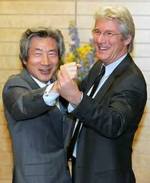I noticed that we were being linked to by this slightly curious post on a forum devoted to the Chinese Military.
Full of Japanese insisting that Jap nats are as much lunatic fringe as certain members on this forum.
I sincerely do not believe that Koizumi, if he did not have to do it for the political advantage in the Japanese representative democracy, would go to that particular shrine if he had the choice. It’s not worth ruining relations with China and Korea, and if Japan wants to become a normal country it has to at least stop it with the shrine visits: it can argue that it has given sufficient reparations for its abuses during WW2 and its occupation of China and Korea, but certainly there is no sense in the war criminal shrine.
First of all, why in hell would he think that we’re Japanese? I can’t imagine anything that would suggest that even remotely.
Second, in response to the idea that Koizumi is forced to engage in the Yasukuni shrine visits because of domestic political concerns and not his own beliefs. I agree that this is the case, but not in the way that the poster suggests.
The important thing to remember is that while Japan is a country with a democratically elected parliament, their head of government is a prime minister chose by the elected parliament, and not directly chosen by the people. What this means is that Koizumi does not have to appeal directly to any voters outside of his home territory of Kanagawa prefecture district 11 (Yokosuka and Miura Cities). He is prime minister due to the fact that he is the president of the ruling Liberal Democratic Party (LDP), and when he engages in activity best described as ‘pandering to his base’, i.e. the Yasukuni visits, he is pandering not to the general electorate of Japan as say a US President must, but to the LDP Diet members that actually selected him as Prime Minister.
Let me clarify some more. The LDP, despite the name, is in fact the most conservative of all the major political parties in Japan. Koizumi is actually a member of the most liberal faction of the LDP (the LDP is divided into formally organized factions, something like sub-parties that band together for political strength). Ever since he rose to prominence in the party he has been a controversial figure, a driving force for economic structural reform and various significant liberalizations in Japan’s domestic policy. How exactly did a young, divorced geisha-dating, liberal reformer get to be the president of the conservative right-wing virtually unchallenged for half a century Liberal Democratic Party? Yasukuni.
The visits to Yasukuni are Koizumi’s deal with the devil. To secure the support of enough of the arch-conservative power bosses within the party, to get himself into the position from which he would have a chance to even attempt to reform the stagnant and sometimes corrupt Japanese economic machine he had to give them something in return. When he won the presidency of the LDP, he had already lost twice before and it probably looked to him as if he would never be able to succeed without making a concession. What he promised them was that in exchange for cooperation, he would make annual pilgrimages to Yasukuni.
He may very well have been morally opposed to the visits, and he was probably smart enough to realize the potential damage to diplocatic ties with former colonies, but as a politician he decided that domestic reform was a higher priority. Having made that promise, his only choices are to continue the visits or all his entire career to self-distruct. After a significantly weaker showing in the most recent major Diet election the LDP is getting worried, his massively important postal privatization plan almost stalled completely, and time is running out for him to make his mark.
Something that is implicit from all I’ve said above, but I have not yet quite stated explicitly, is that although Prime Minister Koizumi’s annual visits to Yasukuni are required by domestic political concerns, they still do not necessarily reflect any widespread demand for him to do so. He was forced into it to secure the support of a minority faction of his own party, to give him the majority within the party that he needed to become president of the party and then Prime Minister.
I don’t honestly know how much support there is within Japan for the Yasukuni visits, or how strong the nationalist right-wingers have become. From what I have seen, and from what I have heard from people who were in Japan long before I was even born, it does seem that the nationalists have gotten more vocal recently, but are still very, very far from having anything that you could call a popular mandate. I believe that it would be a tragedy for radicals to rise to power again in Japan, and I hope that ultimately the more sensible moderates will prevail. Some people seem to think the radical right-wingers have already won, but I am just trying to explain that this is far from the case. They are only becoming more organized and more vocal, and hopefully the quiet opposition is nothing but a slow response.







